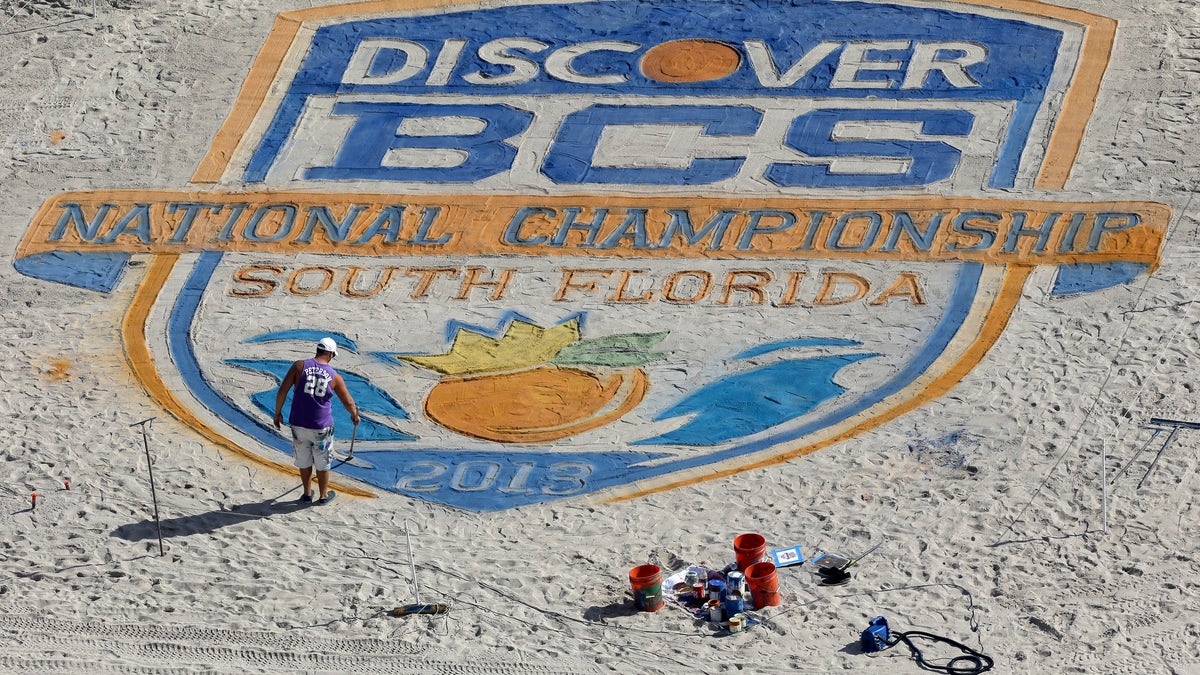
An artist puts the finishing touches on the BCS National Championship logo on the beach Sunday, Jan. 6, 2013, in Fort Lauderdale, Fla. Notre Dame takes on Alabama for the National Championship in an NCAA college football game on Monday night. (AP Photo/Chris O'Meara) (The Associated Press)
The final whistle of the national championship game also signals a new beginning.
It's time to start saying goodbye to the Bowl Championship Series as we know it. The cartel hijacked the postseason in 1998 and despite a tweak here and a tuck there, kept it roughly the same during that run, despite facing more criticism than the replacement refs. Mercifully, though, the 2013-14 season, ending at the Rose Bowl next January, is guaranteed to be the last gasp.
The most obvious change the season after that — without going full Jim Mora on you — will be PLAYOFFS???
Or to be more exact, a four-team mini-playoff in January 2015. The site is still to be chosen from among a half-dozen bids, and after that, the process will be open to all comers, the way the NFL chooses its Super Bowl cities. For plenty of us, that can't happen soon enough.
"I won't kid you, this system has been plenty good to us," Alabama receiver Kevin Norwood said as the second-ranked Crimson Tide wrapped up preparations in search of their third BCS title in the last four years, this time against No. 1 Notre Dame.
"But I got a lot of calls and texts from friends on other teams who don't think it's fair," Norwood added, with a quick glance over his shoulder to see if anyone else was listening in. "Me, too. When I was in high school at D'Iberville (Miss.), the chance to play for a state title was everything. You could lose a game here and there, and not feel like your season was done. It's a lot fairer for everyone."
College football won't be that democratic for a while. How fast and far "bracket creep" begins remains anyone's guess. The current TV deal extends out a dozen years and most of the same guys who ran the last version of the BCS remain in charge. As noted above, they do not like to be bullied.
There's also nothing in the contract that even hints at expanding the format. But if the mini-playoff proves successful enough, and especially if there's some turnover at the top of the conferences in charge, adding four more teams to the mix could come as early as a half-dozen years down the road.
Anything beyond that, especially the 16-team playoff that would do college football justice, is no more than a pipe dream at the moment. Remember: It took a century or so of wrangling just to reach the threshold of a playoff. So for the moment, let's limit the discussion to the mini-playoff.
Asked what challenges the new order will present to the BCS, executive director Bill Hancock thought the committee charged with selecting the playoff teams will be scrutinized way more than its NCAA basketball counterparts. For teams and players, he suggested "the week between the semifinals and the championship game is going to be a big adjustment.
"The rhythm will be a lot different than the regular season. There will still be a break and then a big game, and then a bigger game after that. Pros are used to that," he added. "For 19- and 20-year-old kids, it could be tough."
The toughest adjustment, though, could be the bowl committees themselves. The Rose, Sugar and Orange bowls have already been assured of spots in the national semifinal rotation, expected to be joined by the Fiesta Bowl and two other sites — maybe Atlanta and Dallas.
"We've got a semi every three years and eight other significant games," Orange Bowl CEO Eric Poms said. "Obviously, we're pretty happy with the road map."
Few of the bowl committees further down the food chain are feeling that comfortable. There were 35 bowls this season and while TV ratings have generally held steady, a slight drop in attendance for the second straight year has some in the industry wondering whether they've reached the saturation point.
"I'm getting that question a lot," said Wright Waters, who heads the Football Bowl Association, which looks after the interests and paperwork for all the non-BCS bowls. "My initial reaction is that as long as the bowls continue to market themselves as events, and not just games, and focus on getting strong regional matchups and competitive, compelling games, we'll be fine.
"I think the challenge is going to be the perception — in the minds of the public and the players — more than the reality. I worry are we going to have the seven (BCS-sanctioned) games and everything else will be well, something less. We saw a little bit of that this year, where teams were focused on winning a championship, then went to a second-tier bowl and lost their enthusiasm."
From where he sits, however, Wright doesn't see the long-term problem as supply. With the Western Athletic Conference on the verge of dissolving, there will be 10 conferences playing next season, plus independents and any team with a 6-6 record will be bowl eligible. To make certain the demand for second-tier bowls can be met in a way that makes money for the schools, the committees and the host cities involved, the FBA commissioned an analysis back in August.
"It will be nice to get an opinion for somebody who's actually studied the situation," chuckled Wright, an old-school guy who used to head the Sun Belt Conference. "Up until now, the only thing we've had a surplus of is opinions."
___
Jim Litke is a national sports columnist for The Associated Press. Write to him at jlitke(at)ap.org and follow him at www.Twitter.com/JimLitke








































